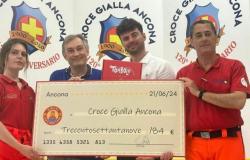Short hospitalizations, immediate recovery and increased life expectancy. Campania remains at the forefront in the treatment of heart valve diseases, pathologies that are constantly increasing in our country due to the aging of the population.
According to the latest data from the Register of the activity of Italian hemodynamic and interventional cardiology centers of the Italian Society of Interventional Cardiology (GISE), the Pineta Grande Hospital of Castel Volturno is present in the national ranking in fourth place in Italy for the number of minimally invasive transcatheter interventions on the aortic valve, with over 300 procedures performed in the last year.
Arturo Giordano, director of the Cardiovascular Interventional Unit of the Pineta Grande center of excellence in Castel Volturno, explains: “The narrowing of the aortic valve, called aortic stenosis, is an increasingly frequent pathology and affects 1 in 8 people over the age of 75 years of age, approximately 68 thousand people in Campania. It causes an obstacle to the flow of blood from the heart to the rest of the body. This condition puts the heart in difficulty and leads to the appearance of symptoms such as fatigue, pain or fainting. Unfortunately, especially after the onset of symptoms, there is a significant increase in the risk of death, so much so that less than 5% of patients survive 3 years after diagnosis.”
Today the most used treatment for aortic stenosis is TAVI, transcatheter replacement of the aortic valve, which allows intervention on this pathology without opening the chest but through a puncture in the groin and without general anesthesia. Campania is at the forefront of this type of treatment thanks to the Interventional Cardiology of the Pineta Grande Hospital directed by Arturo Giordano which ranks among the first in Italy.
“TAVI means the implantation of a biological aortic valve through a catheter generally introduced into the femoral artery – declares Giordano – The peculiarity of TAVR is its minimal invasiveness: the chest is not opened, neither general anesthesia nor extracorporeal circulation is needed; the hospital stay is short (3-5 days) and discharge takes place directly at the patient’s home, without going through a rehabilitation centre. Our center, due to experience and the high volume of activity, is entrusted with various pilot studies on new transcatheter aortic prostheses and we are the first in Italy to have been chosen for the launch of a new latest generation aortic valve which places us at the cutting edge in Italy and helps us deal with even extremely complex cases.”
The Cardiovascular Interventional Unit directed by Dr. Giordano is in fact the first structure in Italy to have implanted, last May, immediately after European approval, the new Navitor Vision transcatheter aortic valve from the American company Abbott, a minimally invasive device cutting edge that sets a new standard in transcatheter aortic valve replacement, enabling better positioning and better patient outcomes. The innovative procedures, which see the Cardiovascular Interventional team of the Pineta Grande Hospital as leaders in Italy, involve, in addition to Antonio Giordano, many professionals expert in the treatment of heart valve diseases including Paolo Ferraro, Nicola Corcione, Alberto Morello, Michele Cimmino and Michele Albanian.





